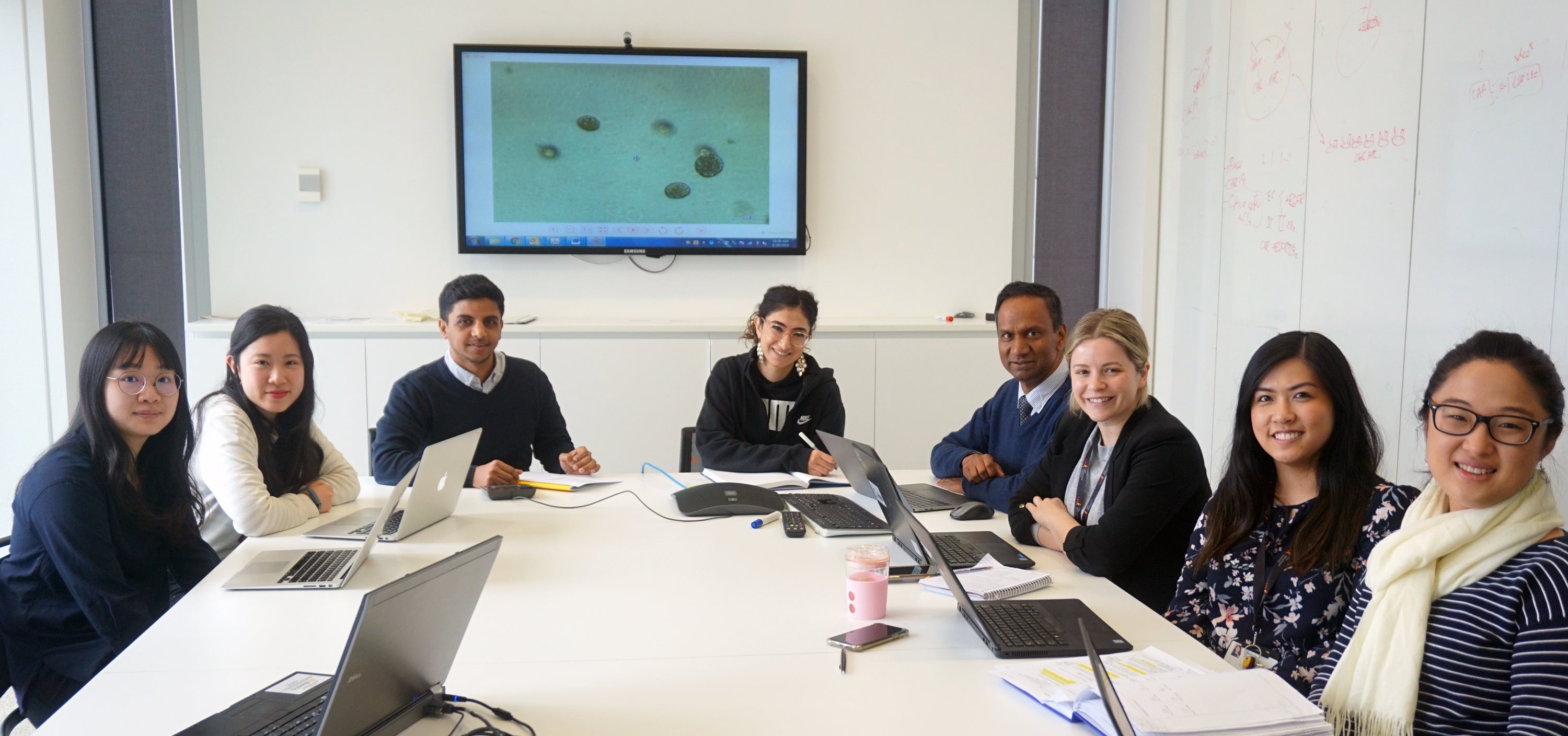September 4, 2019 Print
Polycystic kidney disease or PKD is the most common inherited cause of kidney disease worldwide. For PKD Awareness Day, we spoke to Associate Professor Gopi Rangan, head of our Polycystic Kidney Disease Group, and clinician (nephrologist) at Westmead Hospital, to find out more about the condition, and how researchers are working to help those affected.
 Associate Professor Gopi Rangan with his research team at The Westmead Institute for Medical Research.
Associate Professor Gopi Rangan with his research team at The Westmead Institute for Medical Research.
What is polycystic kidney disease (PKD)?
PKD is characterised by the formation of hundreds of cysts in the kidney. There are two main types: autosomal recessive PKD, which occurs in children, and autosomal dominant PKD, which occurs in adults. Without adequate treatment, both types of the disease can progress to kidney failure.
How many Australians are affected by PKD?
Approximately 12,000 Australians have PKD, of which 2,000 will progress to kidney failure, which can only be managed with dialysis or a kidney transplant.
Worldwide, the condition affects approximately 12 million people.
What causes PKD?
PKD is caused by a variation (or ‘change’) in the function of specific genes. These variations are what causes cysts to form in the kidney.
People with autosomal dominant PKD will have cysts that are detectable from young adulthood. Without treatment, the cysts will continue to grow and cause kidney failure in adulthood.
In autosomal recessive PKD, the cysts usually form during development in the uterus, and cause kidney failure soon after birth or early childhood.
What are the symptoms of PKD?
Not all people with autosomal dominant PKD will know they have the condition. Approximately half of all patients will have few or no symptoms. In these cases, people may not experience disease complications.
When symptoms are present, they vary from person to person. Common symptoms are kidney and abdominal pain, high blood pressure, tiredness and reduced kidney function.
Autosomal recessive PKD is symptomatic in all cases.
How is PKD diagnosed?
In autosomal dominant PKD, a diagnosis is typically made using family history and a kidney ultrasound. Genetic testing is available, but the results are complex and can be difficult to interpret, so it is not usually recommended.
Autosomal recessive PKD is always symptomatic, and a diagnosis can be made based on these symptoms.
What are the complications of PKD?
Unfortunately, there is currently no cure for PKD, so treatment is essential for preventing complications. Adults with untreated autosomal dominant PKD may experience hypertension and a reduction in kidney function, which can progress to kidney failure.
Approximately 10 per cent of individuals may have cerebral aneurysms, which can rupture and cause bleeding within the brain.
In children with autosomal recessive PKD, the main complication is kidney failure.
How is research making a different to the lives of people affected by PKD?
Research has and will continue to make a tremendous difference to people affected by PKD. Research in this area has been a global effort and there have been numerous advances in both methods of diagnosis and treatment.
In the last 25 years, the method of diagnosis by ultrasound was perfected, the causative gene has been discovered and just this year, the first drug to treat autosomal dominant PKD, has become available. This has triggered many more clinical trials to start. It’s a very exciting time in research time in PKD because we are finally seeing meaningful outcomes.
Yet we are still only at the beginning and the progress in the future will much faster – people with PKD should be very hopeful that future research will lead to the developments of new treatments. In addition, there is now good evidence that lifestyle factors such as exercise, and maintaining a healthy weight also slows down disease progression.
How are researchers at The Westmead Institute for Medical Research helping people with PKD?
Our multi-disciplinary team at WIMR and Westmead Hospital is working hard in trying to solve PKD. We have a number of projects ranging from clinical trials to drug discovery, including the PREVENT-ADPKD clinical trial. This is the world’s largest study on whether maintaining hydration will slow down cyst grow, by blocking the action of a hormone – vasopressin – that can make cysts grow.
We are also investigating the mechanisms of how and when cysts from in the kidney in our laboratory. These studies could help aid the development of new treatments, because previous research has primarily focused on how to slow cyst growth, rather than how and why they form. It’s preferable to prevent damage to the kidneys before it occurs, rather than treating the damage.
What do you hope to achieve through your research into PKD?
The team’s aspiration is to help people affected by PKD to live as normal a life as possible. We hope to achieve this through the development of high-value treatments that can be easily implemented into clinical practice (such as the results of the PREVENT-ADPKD study), and also the more difficult challenge of developing highly effective medications that are also safe.
Professor Gopi Rangan is affiliated with The Westmead Institute for Medical Research, Westmead Hospital, Western Sydney Local Health District, and the University of Sydney.